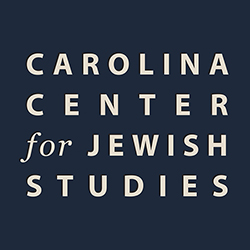Investing in Students… and their Exceptional Research
Research topics explored by Carolina students have ranged from Jewish communities in Moldova, to Jewish-American composer Kurt Weill, Jewish and Islamic schools in North Carolina, Holocaust survivors in Lithuania, and Israeli medical centers. Our students have traveled extensively throughout the country and around the world—to Ethiopia, France, Ukraine, Germany and Israel—in pursuit of knowledge. And they have spent countless hours studying collections in leading libraries and museums, including YIVO Institute for Jewish Research, National Library in Jerusalem, U.S. Holocaust Memorial Museum, the Library of Congress, the Galicia Jewish Museum and the Getty Research Institute.
Their research topics and travel destinations are as diverse and individualized as the students themselves, but one thing remains constant—they need funding to pursue these projects, to travel to the information sources and often to spend weeks out of town. In just the past two years, the Center has provided 30 research and travel grants to Carolina’s undergraduates and graduate students working in the field of Jewish Studies, but the Center is unable to fully fund all of the worthy grant requests. With the increasing number of students interested in Jewish studies, the need for support will likewise continue to grow.
Private support makes it possible for the Center to fund student research. To further illustrate the breadth of their research, we asked some of the students who received funding one recent summer to write about their projects:
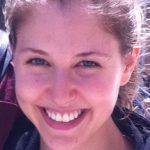 Through the generous support of UNC’s Carolina Center for Jewish Studies, by the end of the summer I will have had the invaluable opportunity to accomplish many of my academic and career goals that contribute greatly to my dissertation research on the everyday life of the Jewish community in Budapest under Nazi occupation. In May 2015, I attended the Hungarian Studies Association of Canada’s Annual Conference in Ottawa, where I presented my first academic paper. In June 2015, I am attending another conference at the United States Holocaust Memorial Museum (USHMM) in Washington, DC. During and after this conference I will be conducting archival research at USHMM, where I will be consulting the pertinent sources that will afford me a rare glimpse at the secretive – and often undocumented – nature of resistance and survival tactics employed by Budapest’s Jews during the Final Solution. Without the support of UNC’s Carolina Center for Jewish Studies’ Travel and Research Grant, I would not have been able to attend these conferences, visit the archives, and more generally make such important advances in my career as a PhD candidate. – Allison Somogyi, PhD Candidate, Department of History Through the generous support of UNC’s Carolina Center for Jewish Studies, by the end of the summer I will have had the invaluable opportunity to accomplish many of my academic and career goals that contribute greatly to my dissertation research on the everyday life of the Jewish community in Budapest under Nazi occupation. In May 2015, I attended the Hungarian Studies Association of Canada’s Annual Conference in Ottawa, where I presented my first academic paper. In June 2015, I am attending another conference at the United States Holocaust Memorial Museum (USHMM) in Washington, DC. During and after this conference I will be conducting archival research at USHMM, where I will be consulting the pertinent sources that will afford me a rare glimpse at the secretive – and often undocumented – nature of resistance and survival tactics employed by Budapest’s Jews during the Final Solution. Without the support of UNC’s Carolina Center for Jewish Studies’ Travel and Research Grant, I would not have been able to attend these conferences, visit the archives, and more generally make such important advances in my career as a PhD candidate. – Allison Somogyi, PhD Candidate, Department of History
|
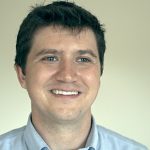 A summer research fellowship from the Carolina Center for Jewish Studies has allowed me to do crucial archival research and to devote my full summer to dissertation research, which focuses on the history of the Arbeter Ring (Workmen’s Circle) in southern cities. Last week, I spent several days in the YIVO Archives at the Center for Jewish History in New York City, where I found a large collection of documents related to my work, and in July I plan to visit Atlanta to conduct more research, including an oral history interview. This generous funding has significantly accelerated my dissertation writing process. – Josh Parshall, PhD Candidate, Department of American Studies A summer research fellowship from the Carolina Center for Jewish Studies has allowed me to do crucial archival research and to devote my full summer to dissertation research, which focuses on the history of the Arbeter Ring (Workmen’s Circle) in southern cities. Last week, I spent several days in the YIVO Archives at the Center for Jewish History in New York City, where I found a large collection of documents related to my work, and in July I plan to visit Atlanta to conduct more research, including an oral history interview. This generous funding has significantly accelerated my dissertation writing process. – Josh Parshall, PhD Candidate, Department of American Studies
|
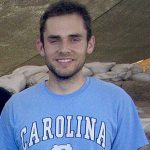 We are right in the middle of our excavation season right now, and I am grateful for the funding from the Carolina Center for Jewish Studies that helped get me here. This is my fourth year on the dig but first year as a UNC PhD student. It is a great opportunity to be a part of excavating an ancient synagogue, as well as being involved in teaching other students about archaeology. – Bryan Bozung We are right in the middle of our excavation season right now, and I am grateful for the funding from the Carolina Center for Jewish Studies that helped get me here. This is my fourth year on the dig but first year as a UNC PhD student. It is a great opportunity to be a part of excavating an ancient synagogue, as well as being involved in teaching other students about archaeology. – Bryan Bozung
PhD Candidate, Department of Religious Studies
|
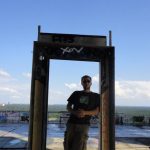 I am examining Berlin’s transformation from the capital of Nazi Germany to a symbol of freedom and resilient democracy in the Cold War. My research has unearthed how this remarkable development derived from a network of liberal American occupation officials, and returned émigrés, or remigrés, of the formerly Marxist Social Democratic Party (SPD). Moreover, the roots of the network that redefined postwar West Berlin lie in wartime Manhattan. These activists met in Washington Heights’ German-Jewish exile circles in their shared fight against Hitler. Despite the loss of loved ones in the Holocaust and Berlin’s destruction as the war’s last European battlefield, they returned hoping to bring democracy. The Center’s funding has allowed me to research motivations for return in Dutch and German archives this summer. Preliminary findings suggest that their unique experience of uprooting and political disputes instilled anti-totalitarian convictions that prompted their return to Berlin with autobiographical urgency. – Scott Krause I am examining Berlin’s transformation from the capital of Nazi Germany to a symbol of freedom and resilient democracy in the Cold War. My research has unearthed how this remarkable development derived from a network of liberal American occupation officials, and returned émigrés, or remigrés, of the formerly Marxist Social Democratic Party (SPD). Moreover, the roots of the network that redefined postwar West Berlin lie in wartime Manhattan. These activists met in Washington Heights’ German-Jewish exile circles in their shared fight against Hitler. Despite the loss of loved ones in the Holocaust and Berlin’s destruction as the war’s last European battlefield, they returned hoping to bring democracy. The Center’s funding has allowed me to research motivations for return in Dutch and German archives this summer. Preliminary findings suggest that their unique experience of uprooting and political disputes instilled anti-totalitarian convictions that prompted their return to Berlin with autobiographical urgency. – Scott Krause
PhD Candidate, Department of History
|
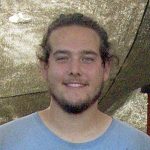 Thanks to the generous grant from the Carolina Center for Jewish Studies, I have been able to return to the Huqoq Excavation Project for the 2015 dig season. Through this grant, I have been able to document for the first time at Huqoq the different layers of occupation (ranging up to the mid-20th century) from the site fully within the walls of what was the Byzantine synagogue. This last week of excavation should see the completion of our original season goals, and in the coming weeks we will hopefully be able to share more about our finds this season. But I want to again thank the Center and the donors without whom none of our work would be possible. – David Culclasure, PhD Candidate, Department of Classics Thanks to the generous grant from the Carolina Center for Jewish Studies, I have been able to return to the Huqoq Excavation Project for the 2015 dig season. Through this grant, I have been able to document for the first time at Huqoq the different layers of occupation (ranging up to the mid-20th century) from the site fully within the walls of what was the Byzantine synagogue. This last week of excavation should see the completion of our original season goals, and in the coming weeks we will hopefully be able to share more about our finds this season. But I want to again thank the Center and the donors without whom none of our work would be possible. – David Culclasure, PhD Candidate, Department of Classics
|
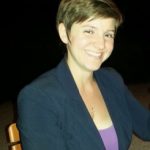 The Christopher Browning Holocaust Research and Travel Grant I received from the Carolina Center for Jewish Studies for the summer of 2015 will greatly enhance my ability to conduct my dissertation research. Used in conjunction with two other awards, the monetary support from the Center will enable me to afford airfare, train-fare, and room and board in Germany for seven months of residence in Berlin, Freiburg, and Ludwigsburg, Germany, as well transportation to and from the Bundesarchive and photocopies of documents there. I will spend my time in the Bundesarchive in Berlin, the largest archive of Nazi records in Germany, and in Freiburg and Ludwigsburg, where the German military and post-war justice records are respectively held. My work on the Nazi occupation of Norway and the Lebensborn program aims to deepen our understanding of the Nazi racial ideology and policies behind the Holocaust by exploring their “positive eugenics” counterparts in Nazi treatment of the Norwegian population. With generous support of the Center, I will be able to examine in depth several of the most important documents for my dissertation project, following up on my pre-dissertation research from last summer and moving significantly further towards completing my doctorate. – Caroline Nilsen, PhD Candidate, Department of History The Christopher Browning Holocaust Research and Travel Grant I received from the Carolina Center for Jewish Studies for the summer of 2015 will greatly enhance my ability to conduct my dissertation research. Used in conjunction with two other awards, the monetary support from the Center will enable me to afford airfare, train-fare, and room and board in Germany for seven months of residence in Berlin, Freiburg, and Ludwigsburg, Germany, as well transportation to and from the Bundesarchive and photocopies of documents there. I will spend my time in the Bundesarchive in Berlin, the largest archive of Nazi records in Germany, and in Freiburg and Ludwigsburg, where the German military and post-war justice records are respectively held. My work on the Nazi occupation of Norway and the Lebensborn program aims to deepen our understanding of the Nazi racial ideology and policies behind the Holocaust by exploring their “positive eugenics” counterparts in Nazi treatment of the Norwegian population. With generous support of the Center, I will be able to examine in depth several of the most important documents for my dissertation project, following up on my pre-dissertation research from last summer and moving significantly further towards completing my doctorate. – Caroline Nilsen, PhD Candidate, Department of History
|
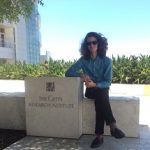 This summer I will be conducting archival research at both the Charles E. Young Research Library at UCLA and the Getty Research Institute, both in Los Angeles. My work will focus on the photographer Julius Shulman, whose works were crucial in documenting the rise of the “Mid-Century Modern” style of residential architecture. I use Shulman’s work and legacy to query the relation between Jewish assimilation and middle class aesthetics in America–and especially in Los Angeles–following the Second World War. In these libraries, I will be working primarily with Shulman’s unpublished writings, including essays and correspondence, as well as with documents concerning the preservation of the buildings and styles made famous by Shulman’s lens. I am deeply grateful to the Carolina Center for Jewish Studies for facilitating this work. – Travis Alexander, Mellon Graduate Fellow, PhD Candidate, Department of English and Comparative Literature This summer I will be conducting archival research at both the Charles E. Young Research Library at UCLA and the Getty Research Institute, both in Los Angeles. My work will focus on the photographer Julius Shulman, whose works were crucial in documenting the rise of the “Mid-Century Modern” style of residential architecture. I use Shulman’s work and legacy to query the relation between Jewish assimilation and middle class aesthetics in America–and especially in Los Angeles–following the Second World War. In these libraries, I will be working primarily with Shulman’s unpublished writings, including essays and correspondence, as well as with documents concerning the preservation of the buildings and styles made famous by Shulman’s lens. I am deeply grateful to the Carolina Center for Jewish Studies for facilitating this work. – Travis Alexander, Mellon Graduate Fellow, PhD Candidate, Department of English and Comparative Literature
|
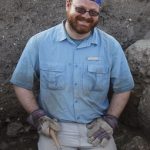 Update from the field: Thanks to the generous grant I received from the Carolina Center for Jewish Studies, I have returned for my fifth excavation season at the archaeological site of Huqoq, where I am an area supervisor. This season, I am excavating the courtyard adjacent to the medieval public building and Byzantine synagogue to relate these structures with the courtyard and its cistern. We are just starting to excavate medieval material, so we will hopefully have answers to our season’s questions soon. Thanks again to the Center and their donors for supporting our project and enabling me to join the excavation for another year. – Brian A. Coussens, PhD Candidate, Department of Religious Studies Update from the field: Thanks to the generous grant I received from the Carolina Center for Jewish Studies, I have returned for my fifth excavation season at the archaeological site of Huqoq, where I am an area supervisor. This season, I am excavating the courtyard adjacent to the medieval public building and Byzantine synagogue to relate these structures with the courtyard and its cistern. We are just starting to excavate medieval material, so we will hopefully have answers to our season’s questions soon. Thanks again to the Center and their donors for supporting our project and enabling me to join the excavation for another year. – Brian A. Coussens, PhD Candidate, Department of Religious Studies
|
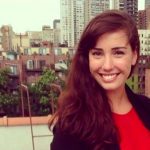 This year, I was fortunate to receive the Center’s Summer Stipend in support of my research on multilingualism during the Holocaust. My project utilizes the experience of Greek Jews as a case study through which it aims to shed light on the consequences of belonging to a linguistic minority in Nazi concentration camps more generally. It looks at the duality of linguistic isolation experienced by the non-Yiddish speaking Greek Jewish community, as well as the ways in which their unusual linguistic background (which included Judeo-Spanish, French, Greek, Turkish, and Hebrew) functioned as a survival tool in its own right, enabling Greek Jews to covertly share information with their compatriots, thereby fostering a unique sense of solidarity among members of this marginalized community. Thanks to the generosity of the Center and the Jack O. Spies and Family Jewish Studies Fund, I had the opportunity to travel to Greece this past summer to solidify my proficiency in Modern Greek and to begin research in the country’s archives. In addition to taking language courses at the Athens Centre and Aristotle University of Thessaloniki, I was able to connect with the organized Jewish Community of Athens, as well as gain access to the archives of the Jewish Museum of Greece in Athens and the Research and Documentation Centre of the Jewish Museum of Thessaloniki. These experiences have been greatly beneficial to the progress of my project, which now enjoys new source material and linguistic possibilities. – Robin Buller, PhD Candidate, History Department This year, I was fortunate to receive the Center’s Summer Stipend in support of my research on multilingualism during the Holocaust. My project utilizes the experience of Greek Jews as a case study through which it aims to shed light on the consequences of belonging to a linguistic minority in Nazi concentration camps more generally. It looks at the duality of linguistic isolation experienced by the non-Yiddish speaking Greek Jewish community, as well as the ways in which their unusual linguistic background (which included Judeo-Spanish, French, Greek, Turkish, and Hebrew) functioned as a survival tool in its own right, enabling Greek Jews to covertly share information with their compatriots, thereby fostering a unique sense of solidarity among members of this marginalized community. Thanks to the generosity of the Center and the Jack O. Spies and Family Jewish Studies Fund, I had the opportunity to travel to Greece this past summer to solidify my proficiency in Modern Greek and to begin research in the country’s archives. In addition to taking language courses at the Athens Centre and Aristotle University of Thessaloniki, I was able to connect with the organized Jewish Community of Athens, as well as gain access to the archives of the Jewish Museum of Greece in Athens and the Research and Documentation Centre of the Jewish Museum of Thessaloniki. These experiences have been greatly beneficial to the progress of my project, which now enjoys new source material and linguistic possibilities. – Robin Buller, PhD Candidate, History Department
|
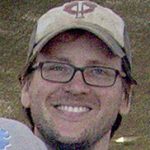 The Carolina Center for Jewish Studies has been an instrumental part of my dissertation research. For five years, the Center has funded my summer travels to Israel where I fulfill my role as the ceramic specialist on the Huqoq Excavation Project. The dig is based out of the Department of Religious Studies at UNC-CH, directed by Jodi Magness. My dissertation will accomplish three goals relevant to the fields of anthropology, classical archaeology, and religious studies: provide a useful apparatus in the form of a typology and chronology of common/local pottery for present and future excavators researching Northern Palestine; underscore the need for comprehensive studies of common pottery in Roman and Byzantine provincial contexts as well as heritage material from prior excavations; potentially revise many traditional conceptions relating to the expression of Jewish and Christian identities and dialogue between these groups. Without the generous financial gifts provided by the Center for Jewish Studies, I simply could not conduct the research necessary to complete my dissertation project. – Daniel Schindler, PhD Candidate, Classical Archaeology The Carolina Center for Jewish Studies has been an instrumental part of my dissertation research. For five years, the Center has funded my summer travels to Israel where I fulfill my role as the ceramic specialist on the Huqoq Excavation Project. The dig is based out of the Department of Religious Studies at UNC-CH, directed by Jodi Magness. My dissertation will accomplish three goals relevant to the fields of anthropology, classical archaeology, and religious studies: provide a useful apparatus in the form of a typology and chronology of common/local pottery for present and future excavators researching Northern Palestine; underscore the need for comprehensive studies of common pottery in Roman and Byzantine provincial contexts as well as heritage material from prior excavations; potentially revise many traditional conceptions relating to the expression of Jewish and Christian identities and dialogue between these groups. Without the generous financial gifts provided by the Center for Jewish Studies, I simply could not conduct the research necessary to complete my dissertation project. – Daniel Schindler, PhD Candidate, Classical Archaeology
|
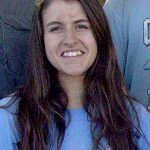 My name is Stephanie Grant and I received a grant this year from the Carolina Center for Jewish Studies to help fund my trip to Huqoq, Israel, as I work on the archaeology excavation there. This esteemed project is led by Professor Magness and focuses on the village of Huqoq. The town lies in the middle of an area that is known for Jesus’ ministry. The modern name for the village is Yakuk, and the project has a plan with three major aspects. The first is give an accurate date to the ancient synagogue in the village. The second is to excavate the surrounding town of Huqoq and search for evidence that can give more information about the everyday life of the ancient town, and the third is to excavate a portion of the more recent village of Yakuk, an Arab community that was inhabited until less than a hundred years ago. The discoveries made in Huqoq in the past few years have been extraordinary, especially the mosaics on the synagogue floor, images showing biblical stories of Samson. This excavation will give me irreplaceable experience and without the grant I received, I would not be able to cover the cost on my own. The Center’s generosity gives me the opportunity to pursue this amazing experience. – Stephanie Grant, ’18, Archaeology My name is Stephanie Grant and I received a grant this year from the Carolina Center for Jewish Studies to help fund my trip to Huqoq, Israel, as I work on the archaeology excavation there. This esteemed project is led by Professor Magness and focuses on the village of Huqoq. The town lies in the middle of an area that is known for Jesus’ ministry. The modern name for the village is Yakuk, and the project has a plan with three major aspects. The first is give an accurate date to the ancient synagogue in the village. The second is to excavate the surrounding town of Huqoq and search for evidence that can give more information about the everyday life of the ancient town, and the third is to excavate a portion of the more recent village of Yakuk, an Arab community that was inhabited until less than a hundred years ago. The discoveries made in Huqoq in the past few years have been extraordinary, especially the mosaics on the synagogue floor, images showing biblical stories of Samson. This excavation will give me irreplaceable experience and without the grant I received, I would not be able to cover the cost on my own. The Center’s generosity gives me the opportunity to pursue this amazing experience. – Stephanie Grant, ’18, Archaeology
|
